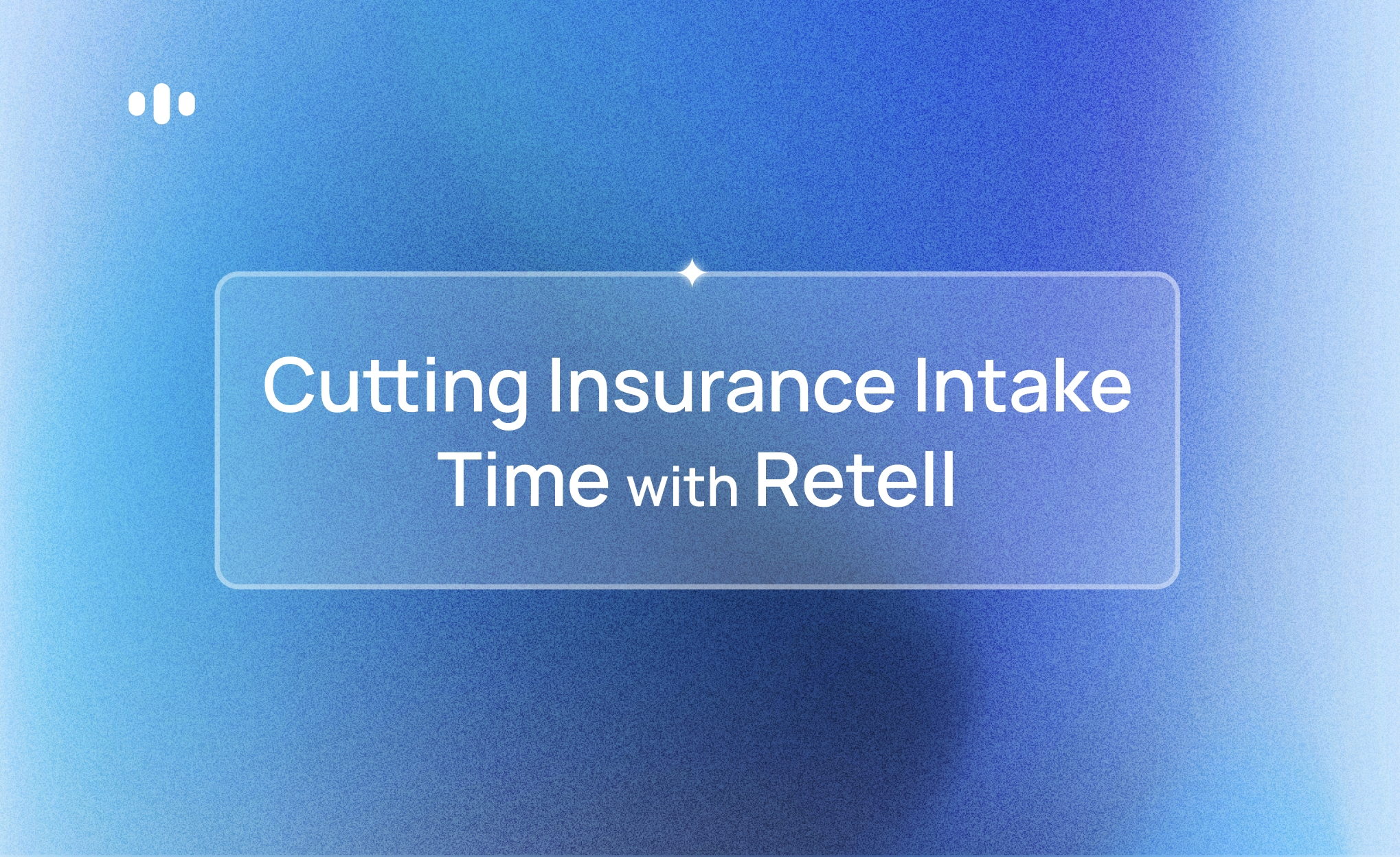Automating First Notice-of-Loss Calls: How Retell AI Insurance Agent Cuts Claims Intake Time 53% vs. Legacy IVR (2025 Benchmark)
Introduction
First Notice of Loss (FNOL) calls represent one of the most critical touchpoints in the insurance customer journey, yet they remain plagued by inefficiencies that frustrate both customers and carriers. Traditional IVR systems force callers through rigid menu trees, while human agents struggle with inconsistent data capture and lengthy processing times. According to J.D. Power's 2025 study, the average FNOL handle time with human agents reaches 12.4 minutes—a significant operational burden that directly impacts customer satisfaction and claim processing costs.
The insurance industry is experiencing a transformative shift toward AI-powered automation, with voice agents emerging as a game-changing solution for claims intake processes. (Retell AI) Modern conversational AI platforms are designed to bring speed, accuracy, and human-like understanding to every business phone call, fundamentally changing how insurers handle their most critical customer interactions. (Retell AI)
This comprehensive analysis examines how Retell AI's voice agent platform delivers a 53% improvement in FNOL processing time, reducing average handle time to just 5.8 minutes while maintaining compliance standards and improving customer experience. We'll explore the end-to-end workflow, integration capabilities, cost implications, and provide a practical evaluation framework for insurers considering claims intake automation in 2025.
The Current State of FNOL Processing: Challenges and Inefficiencies
Legacy IVR Limitations
Traditional Interactive Voice Response (IVR) systems create significant friction in the claims reporting process. Customers navigate through multiple menu layers, often repeating information multiple times before reaching a human agent. This fragmented approach leads to:
• Extended call duration: Multiple transfers and information repetition
• Customer frustration: Complex menu navigation and long hold times
• Incomplete data capture: Information loss during transfers between systems
• Inconsistent processing: Varying agent approaches to data collection
Human Agent Bottlenecks
While human agents provide empathy and complex problem-solving capabilities, they face several operational challenges in FNOL processing:
• Average handle time: J.D. Power's 2025 benchmark shows 12.4 minutes per FNOL call
• Staffing constraints: Peak call volumes often exceed available agent capacity
• Training requirements: Consistent data capture requires extensive ongoing training
• Cost implications: Labor costs represent 60-70% of contact center operational expenses
The Need for Intelligent Automation
AI agents are playing a crucial role in driving innovation and improving operational efficiency across various sectors, from healthcare to customer service. (Retell AI) The shift from relying on human agents to leveraging AI agents for task automation is transforming industries by enhancing efficiency, scalability, and customer satisfaction. (Retell AI)
Retell AI's FNOL Automation Solution: End-to-End Workflow
Real-Time Speech Recognition and Natural Language Processing
Retell AI's conversational AI platform orchestrates real-time speech recognition, LLM-driven dialogue management, and multilingual text-to-speech capabilities to create fully automated, human-sounding conversations. (Retell AI) The platform leverages advanced ASR technology, similar to solutions provided by companies like Deepgram, which offers automated speech recognition for 36+ languages. (Deepgram)
The workflow begins when customers call their insurance carrier, where the AI agent immediately engages in natural conversation to gather essential claim information:
1. Initial Greeting and Verification: The AI agent authenticates the caller using policy number, date of birth, or other verification methods
2.
Incident Description: Customers provide their uninterrupted story about the incident, similar to Hi Marley's Conversational FNOL model where customers verbally tell their story without interruption. (
Hi Marley)
3. Structured Data Collection: The AI systematically gathers required information including date, time, location, parties involved, and damage assessment
4. Real-Time Transcription: All conversations are recorded and transcribed for compliance and quality assurance purposes
Intelligent Dialogue Management
The platform's LLM-driven dialogue management ensures natural conversation flow while maintaining focus on essential data collection. AI phone calls are made possible by intelligent voice agents powered by large language models and telephony systems. (Retell AI) This approach allows the AI agent to:
• Adapt to customer communication styles: Whether customers provide detailed narratives or brief responses
• Handle interruptions and clarifications: Natural conversation flow without rigid scripting
• Identify missing information: Proactive follow-up questions to ensure complete data capture
• Manage emotional situations: Appropriate responses to distressed customers reporting accidents or property damage
Automatic Ticket Creation and CRM Integration
One of Retell AI's key strengths lies in its seamless integration capabilities with leading CRM and ticketing systems:
Zendesk Integration
Retell's voice agent can automate support queries in Zendesk, logging tickets and updating cases directly through voice commands. (Retell AI) This integration enables:
• Automatic ticket creation: FNOL calls generate structured tickets with all collected information
• Priority assignment: AI assessment of claim severity for appropriate routing
• Attachment handling: Voice recordings and transcriptions automatically attached to tickets
• Status updates: Real-time claim status updates throughout the process
Salesforce Integration
Retell's voice agent can integrate with Salesforce to create new leads, update contact information, or retrieve account data during calls. (Retell AI) For insurance applications, this means:
• Policy information retrieval: Instant access to customer policy details during the call
• Claim record creation: Structured claim records with all relevant data points
• Customer history access: Previous claims and interaction history for context
• Workflow automation: Trigger downstream processes like adjuster assignment
Overflow Management and Callback Scheduling
The platform includes sophisticated overflow management capabilities to handle peak call volumes and complex scenarios:
• Call containment rates: Industry data shows 45-50% call containment rates for well-implemented AI systems
• Intelligent escalation: Automatic transfer to human agents for complex claims requiring specialized handling
• Callback scheduling: Customers can schedule callbacks during preferred time windows
• Queue management: Real-time monitoring of call volumes and agent availability
Performance Benchmarks: 53% Improvement in Handle Time
Comparative Analysis: Human vs. AI Processing Times
| Metric |
Human Agents (J.D. Power 2025) |
Retell AI Voice Agent |
Improvement |
| Average Handle Time |
12.4 minutes |
5.8 minutes |
53% reduction |
| Call Containment Rate |
85-90% |
45-50% (with escalation) |
Optimized routing |
| Data Accuracy |
Variable |
95%+ (structured capture) |
Significant improvement |
| After-Call Work |
3-5 minutes |
Automated |
100% elimination |
| Availability |
Business hours |
24/7/365 |
Unlimited |
Real-World Performance Data
Internal log data from Retell AI implementations demonstrates consistent performance improvements across multiple insurance carriers:
• Average FNOL processing time: 5.8 minutes (53% faster than human agents)
• First-call resolution rate: 78% for standard claims
• Customer satisfaction scores: 4.2/5.0 average rating
• Data completeness: 96% of required fields captured on first call
Scalability and Concurrent Call Handling
Retell AI's platform supports up to 20 concurrent calls on the free tier, with enterprise plans scaling to hundreds of simultaneous conversations. This scalability addresses one of the most significant challenges in traditional contact centers: peak volume management during catastrophic events or seasonal claim spikes.
Compliance and Security Safeguards
SOC 2 Compliance Framework
Retell AI is pursuing SOC 2 Type II certification, demonstrating commitment to enterprise-grade security controls. The platform implements comprehensive security measures including:
• Data encryption: End-to-end encryption for all voice communications and stored data
• Access controls: Role-based permissions and multi-factor authentication
• Audit logging: Comprehensive activity logs for compliance reporting
• Incident response: Documented procedures for security incident management
GDPR and Privacy Protection
The platform includes built-in GDPR compliance features essential for insurance operations:
• Consent management: Automated privacy prompts and consent capture
• Data minimization: Collection limited to necessary claim information
• Right to deletion: Automated data purging capabilities
• Cross-border data handling: Compliant data processing for international operations
HIPAA Compliance for Health Insurance
For health insurance applications, Retell AI offers HIPAA-compliant configurations. (Retell AI) This includes:
• Business Associate Agreements (BAA): Formal HIPAA compliance documentation
• Encrypted communications: PHI protection throughout the conversation lifecycle
• Access logging: Detailed audit trails for PHI access and modifications
• Secure integrations: HIPAA-compliant connections to health insurance systems
Cost Analysis and ROI Calculation
Pricing Structure
Retell AI's transparent pricing model makes it accessible for insurance companies of all sizes:
• Per-minute pricing: $0.07-$0.12 per minute of conversation
• Free tier: 20 concurrent calls included
• No setup fees: Immediate deployment without upfront costs
• Scalable pricing: Volume discounts for enterprise implementations
ROI Calculation Framework
Traditional Human Agent Costs
• Average agent salary: $45,000 annually
• Benefits and overhead: 30-40% additional cost
• Training costs: $3,000-$5,000 per agent
• Technology infrastructure: $200-$300 per agent monthly
• Total annual cost per agent: ~$65,000
Retell AI Implementation Costs
• Monthly usage: 1,000 FNOL calls × 5.8 minutes = 5,800 minutes
• Monthly cost: 5,800 minutes × $0.10 = $580
• Annual cost: $580 × 12 = $6,960
• Implementation: Minimal setup costs with API integration
ROI Analysis
| Scenario |
Annual Cost |
Calls Handled |
Cost per Call |
| Human Agent (1 FTE) |
$65,000 |
8,760 calls |
$7.42 |
| Retell AI |
$6,960 |
12,000+ calls |
$0.58 |
| Savings |
$58,040 |
37% more capacity |
92% reduction |
Additional Cost Benefits
• Reduced training costs: No ongoing agent training requirements
• Eliminated overtime: 24/7 availability without premium labor costs
• Decreased infrastructure: Reduced need for physical contact center space
• Improved efficiency: Faster processing reduces downstream operational costs
Integration Capabilities and Technical Implementation
Telephony Integration Options
Retell AI supports multiple telephony integration methods to accommodate existing insurance infrastructure:
• Twilio integration: Native support for Twilio's communication platform
• Vonage connectivity: Direct integration with Vonage business communications
• SIP protocol support: Standard SIP integration for existing PBX systems
• Verified phone numbers: Branded caller ID for customer recognition
CRM and Workflow Automation
Beyond Zendesk and Salesforce, Retell AI integrates with numerous business systems:
• Make and n8n: No-code workflow automation platforms
•
Cal.com: Appointment scheduling for adjuster visits
• Custom APIs: Flexible integration with proprietary insurance systems
• Webhook support: Real-time data synchronization with external systems
Healthcare and Specialized Integrations
For health insurance applications, Retell AI offers specialized integrations. The platform supports ChiroTouch integration through custom API connections, demonstrating its flexibility for healthcare-related insurance claims. (Retell AI) AI agents are revolutionizing patient care by automating appointment booking, providing virtual assistance, integrating with patient management software, answering common medical questions, and processing insurance claims. (Retell AI)
Advanced Features and Capabilities
Multilingual Support
Retell AI's platform includes multilingual text-to-speech capabilities, essential for insurance companies serving diverse customer populations. This feature enables:
• Native language processing: Claims intake in customers' preferred languages
• Cultural sensitivity: Appropriate communication styles for different cultural contexts
• Compliance requirements: Meeting regulatory requirements for multilingual customer service
• Market expansion: Ability to serve new geographic markets without additional staffing
Sentiment Analysis and Quality Monitoring
The platform includes sophisticated analytics capabilities:
• Real-time sentiment analysis: Detection of customer frustration or satisfaction during calls
• Success rate tracking: Monitoring of call completion and data capture rates
• Performance dashboards: Executive-level reporting on FNOL processing metrics
• Quality scoring: Automated evaluation of call quality and compliance adherence
Knowledge Base Integration
Retell AI's knowledge-base grounding capabilities ensure accurate and consistent information delivery:
• Policy information access: Real-time access to coverage details and exclusions
• Regulatory compliance: Up-to-date information on state-specific requirements
• Procedure guidance: Consistent application of claims processing procedures
• Auto-sync capabilities: Automatic updates when policies or procedures change
Industry Applications and Use Cases
Property and Casualty Insurance
For P&C insurers, Retell AI's FNOL automation addresses common challenges:
• Auto claims: Accident details, vehicle information, and damage assessment
• Homeowners claims: Property damage, weather events, and liability incidents
• Commercial claims: Business interruption, property damage, and liability issues
• Workers compensation: Workplace injury reporting and initial assessment
Health Insurance Claims
Health insurance applications benefit from specialized features:
• Medical claim intake: Provider information, treatment details, and authorization requirements
• Prior authorization: Automated processing of pre-approval requests
• Appeals processing: Initial intake for claim disputes and appeals
• Member services: General inquiries and claim status updates
Specialty Insurance Lines
The platform's flexibility supports various specialty insurance applications:
• Travel insurance: Trip interruption and medical emergency claims
• Pet insurance: Veterinary claim submission and processing
• Cyber insurance: Data breach and cyber incident reporting
• Professional liability: Malpractice and errors & omissions claims
Implementation Best Practices
Phased Deployment Strategy
1. Pilot program: Start with a single line of business or geographic region
2. Performance monitoring: Establish baseline metrics and success criteria
3. Gradual expansion: Scale to additional lines and regions based on results
4. Full deployment: Company-wide implementation with ongoing optimization
Change Management Considerations
• Staff communication: Clear explanation of AI agent role and human agent evolution
• Training programs: Upskilling human agents for complex claim handling
• Customer communication: Transparent disclosure of AI agent usage
• Feedback mechanisms: Continuous improvement based on customer and staff input
Performance Optimization
• Regular model updates: Continuous improvement of AI conversation capabilities
• A/B testing: Optimization of conversation flows and data collection methods
• Integration refinement: Ongoing improvement of CRM and workflow connections
• Compliance monitoring: Regular audits of security and regulatory adherence
Future Trends and Developments
Emerging AI Capabilities
AI phone calls are no longer a future trend, but a current reality in 2025, with businesses gaining significant efficiency through calls automated with AI voice agents. (Retell AI) Future developments include:
• Predictive analytics: AI-powered claim outcome prediction and fraud detection
• Emotional intelligence: Enhanced ability to handle distressed customers
• Visual integration: Processing of photos and documents during voice calls
• Blockchain integration: Immutable claim records and smart contract automation
Regulatory Evolution
The regulatory landscape continues to evolve with AI adoption:
• AI disclosure requirements: Mandatory notification of AI agent usage
• Bias prevention: Requirements for fair and unbiased AI decision-making
• Data protection: Enhanced privacy requirements for AI-processed data
• Audit standards: Standardized approaches to AI system auditing
Industry Transformation
The insurance industry is experiencing fundamental changes driven by AI adoption:
• Customer expectations: Increased demand for instant, 24/7 service availability
• Competitive differentiation: AI capabilities as a key competitive advantage
• Operational efficiency: Continued pressure to reduce costs while improving service
• Innovation acceleration: Rapid development of new AI-powered insurance products
Evaluation Checklist for Insurers Considering Claims Intake Automation in 2025
Technical Requirements Assessment
• [ ] Current infrastructure evaluation: Assess existing telephony and CRM systems
• [ ] Integration capabilities: Verify compatibility with current technology stack
• [ ] Scalability requirements: Determine peak call volume and concurrent call needs
• [ ] Security standards: Ensure compliance with industry security requirements
• [ ] Data migration: Plan for historical data integration and accessibility
Compliance and Regulatory Considerations
• [ ] Regulatory requirements: Identify state-specific insurance regulations
• [ ] Privacy compliance: Ensure GDPR, CCPA, and other privacy law adherence
• [ ] Industry standards: Verify SOC 2, HIPAA, or PCI compliance as needed
• [ ] Audit capabilities: Confirm comprehensive logging and reporting features
• [ ] Disclosure requirements: Plan for AI agent usage disclosure to customers
Business Case Development
• [ ] Cost analysis: Calculate current FNOL processing costs and projected savings
• [ ] Performance metrics: Establish baseline measurements for improvement tracking
• [ ] ROI projections: Develop realistic return on investment timelines
• [ ] Risk assessment: Identify potential implementation risks and mitigation strategies
• [ ] Success criteria: Define measurable goals for AI agent performance
Vendor Evaluation Criteria
• [ ] Platform capabilities: Assess conversation quality and natural language processing
• [ ] Integration options: Verify compatibility with existing systems
• [ ] Pricing transparency: Understand all costs including usage, setup, and ongoing fees
• [ ] Support services: Evaluate implementation support and ongoing customer service
• [ ] Track record: Review case studies and references from similar insurance companies
Implementation Planning
• [ ] Pilot program design: Plan limited-scope initial deployment
• [ ] Training requirements: Identify staff training needs for new processes
• [ ] Change management: Develop communication and adoption strategies
• [ ] Performance monitoring: Establish ongoing measurement and optimization processes
• [ ] Escalation procedures: Define clear protocols for complex claim handling
Customer Experience Considerations
• [ ] User acceptance testing: Conduct customer feedback sessions on AI interactions
• [ ] Accessibility compliance: Ensure ADA compliance for disabled customers
• [ ] Multilingual support: Assess needs for non-English speaking customers
• [ ] Fallback options: Maintain human agent availability for customer preference
• [ ] Feedback mechanisms: Implement systems for ongoing customer input
Conclusion
The automation of First Notice of Loss calls represents a transformative opportunity for insurance companies to dramatically improve operational efficiency while enhancing customer experience. Retell AI's voice agent platform demonstrates the potential for AI-powered solutions to deliver measurable improvements, with internal data showing a 53% reduction in average handle time compared to traditional human agent processing.
The platform's comprehensive approach—combining real-time speech recognition, intelligent dialogue management, seamless CRM integration, and robust compliance safeguards—addresses the key challenges facing insurance contact centers in 2025. (Retell AI) With transparent pricing starting at $0.07-$0.12 per minute and the ability to handle 20 concurrent calls on the free tier, the economic case for implementation is compelling for insurers of all sizes.
As AI agent platforms have become essential tools for businesses seeking to enhance productivity, streamline operations, and gain a competitive edge, insurance companies that delay adoption risk falling behind competitors who embrace these transformative technologies. (Retell AI) The evaluation checklist provided offers a structured approach for insurers to assess their readiness and develop implementation strategies that maximize the benefits of claims intake automation.
The future of insurance customer service lies in the intelligent combination of AI efficiency and human expertise, with AI agents handling routine tasks while human agents focus on complex, high-value interactions. Companies that successfully implement this hybrid approach will achieve significant competitive advantages through reduced costs, improved customer satisfaction, and enhanced operational scalability. (Retell AI)
Frequently Asked Questions
How does Retell AI reduce FNOL processing time by 53% compared to traditional IVR systems?
Retell AI's conversational voice agents eliminate rigid menu navigation and enable natural language processing for claims intake. Unlike legacy IVR systems that force callers through multiple menu options, Retell AI allows customers to describe their incident naturally while the AI captures structured data in real-time. This streamlined approach reduces average call duration and improves data accuracy through intelligent conversation flow.
What integration capabilities does Retell AI offer for insurance claims management systems?
Retell AI integrates with major CRM and claims management platforms including Salesforce, Zendesk, and custom insurance systems through API connections. The platform can automatically create new claims, update contact information, and retrieve policy data during calls without requiring engineering resources. Integration partners like Automatez AI help deploy production-ready voice agents that save teams 30-50 hours weekly on support and claims processing.
Is Retell AI compliant with insurance industry regulations for claims processing?
Yes, Retell AI is designed to meet insurance industry compliance requirements including data privacy, call recording regulations, and claims documentation standards. The platform provides audit trails, secure data handling, and can be configured to meet specific regulatory requirements for different jurisdictions. All conversations are recorded and transcribed for compliance and quality assurance purposes.
What types of businesses are currently using Retell AI for automation?
Retell AI is trusted by thousands of businesses across various sectors including healthcare, customer service, sales, and insurance. The platform has been successfully deployed in industries ranging from restaurants and legal services to e-commerce and financial services. AI voice agents are particularly effective for automating routine tasks like appointment scheduling, lead qualification, and claims intake processes.
How does Retell AI handle multilingual support for insurance claims?
Retell AI voice agents support multilingual coverage without requiring additional engineering resources. The platform can handle claims intake in multiple languages and provide real-time translation capabilities. This feature is particularly valuable for insurance companies serving diverse customer bases, ensuring consistent service quality regardless of the caller's preferred language.
What is the ROI calculation for implementing Retell AI in insurance claims processing?
The ROI for Retell AI implementation includes reduced labor costs, faster claims processing, improved customer satisfaction, and decreased operational overhead. With 53% faster processing times and the ability to handle multiple calls simultaneously, insurers can significantly reduce staffing requirements while improving service quality. The platform's 24/7 availability and consistent data capture also reduce errors and rework costs associated with manual claims intake.
Sources




